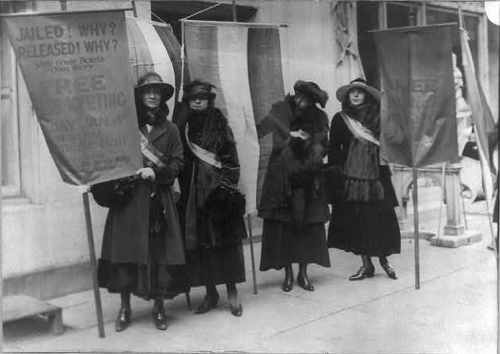It’s not too late to be an informed voter! And, if you are reading this after 6:00 p.m. on November 6, you will be plenty early for the next election!

Why do I vote? Even if people tell me that my vote doesn’t really matter, I know that my voting does. I vote, primarily, because my parents always exercised this right, staying abreast of local and national issues by reading newspapers and news magazines, and discussing political issues in family conversations. As a parent, I try to continue these civic-minded practices.
Secondly, I learned at a fairly young age, that many other countries did not have democratic forms of government or the right to free speech. I also learned about and I lived at the time of many wars and revolutions in which people fought and died for the rights that we enjoy in our democracy. I heard of many immigrants who, once gaining their American citizenship, more fully appreciated their right to vote and exercised that right much more often than the rest of us. At some point, I became determined not to take this right for granted.

Third, because women fought long and hard for the right to vote, and that battle wasn’t won until 1920 with the 19th Amendment, I feel that not voting is not acknowledging their fight.
Even more fierce was the struggle to register African-Americans in the 1960’s, where U.S. citizens were subjected to extreme racism, arrest, torture, and even death (see Freedom Summer Project of 1964: http://myloc.gov/exhibitions/naacp/civilrightsera/e xhibitobjects/mississippifreedomsummer.aspx)
If people were willing to risk everything for this right, how can I, in good conscience, neglect to vote?
Finally, I know I will not have any right to complain about any elected officials unless I vote, unless I take part in the process which allows me to choose and gives me a voice.
What do YOU need to know right now? The most important voter engagement information at this time – just days before the Election – is how to: confirm your registration, find your polling place, learn who’s on your ballot, and maybe track your absentee ballot.
For Indiana residents, all this can be found at the Indiana Statewide Voter Registration System Website:

https://indianavoters.in.gov/PublicSite/Public/FT1/PublicLookupMain.aspx?Link=Registration
On this website, you can enter your county, your name, and date of birth, to bring up the essential information. First, you will see your registration status and your address, then you can click on “Polling Place,” “Who’s on Your Ballot,” “Absentee Ballot, “ and more…
How can YOU (quickly) become a more informed voter?
Now that you know where and when you will vote, as well as who’s on the ballot, how can you get more information about the candidates and the issues?

One source of unbiased information on national issues is Public Agenda and its Citizen Solution Guides. “Public Agenda’s Citizens’ Solutions Guides are nonpartisan, unbiased resources to help you think through a difficult issue in alternative ways, weighing and evaluating values, priorities, pros, cons and tradeoffs.” http://www.publicagenda.org/pages/citizens-solutions-guides These Guides include: the Federal Budget, Health Care, Energy, Education, Jobs and the Economy, and Immigration.
After hearing dire warnings on NPR ‘s Diane Rehm show (http://thedianerehmshow.org/shows/2012-10-29/congress-and-fiscal-cliff), about the imminent danger of the U.S. “falling off the fiscal cliff,” I wanted to know more about the Federal Budget . This Citizen Solution Guide explains both sides of three possible solutions to this issue, and prefaces it with a description of “where things stand,” “five things you need to know,” and “what’s the worst that can happen?” I now have a much better understanding of this national issue.
If you are not sure about the presidential candidates’ positions on the issues, you can go to their official websites:
Barack Obama: http://www.barackobama.com/issues?source=primary-nav-om
Mitt Romney: http://www.mittromney.com/issues
Or, you can look at a nonpartisan comparison of the Romney vs Obama platforms:
Candidate Comparison: http://2012.candidate-comparison.org/?compare=Romney&vs=Obama
If you want to check out the accuracy of what the candidates say, you can go to Fact Check.Org (http://www.factcheck.org/ ), a nonpartisan, nonprofit “consumer advocate” for voters.
How can you learn about all the items on YOUR ballot?
http://onyourballot.vote411.org/build.do
At Vote 411, you can enter your address and view each race on your custom ballot, clicking on two candidates at a time to compare their answers to specific questions. Then, you can “vote” for your choice for President, US Senate, Indiana Governor, Attorney General, etc., and your completed ballot can be sent to your email or printed out.
This ballot (Vote 411) will not show your local races or questions, such as school board, judges, county/city government, or questions about funding local entities. A list of those can be found at the Indiana Voters website: https://indianavoters.in.gov/PublicSite/Public/FT1/PublicLookupMain.aspx?Link=Registration
However, information about each local candidate/issue is probably best found by asking people in your community OR in a special issue of your local newspaper.
With the immediate access we now have to nonpartisan resources, you can become and remain an informed citizen in a timely fashion. Likewise, you can register to vote and check on your registration status almost instantaneously. Recent attempts to limit or restrict our voting in Pennsylvania, and other states, need to be met with resistance, or at least with every effort of exercising this hard-won right.
“Nobody will ever deprive the American people of the right to vote except the American people themselves and the only way they could do this is by not voting.”
Franklin D. Roosevelt

